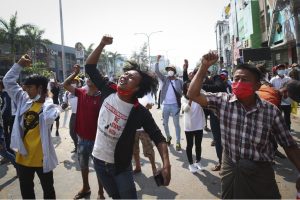By: Kirsten Rasmussen
Journal of Global Rights and Organizations, Associate Articles Editor
MANDALAY, Myanmar – The political turmoil in Myanmar has escalated in the last few days, with former leader Aung San Suu Kyi being charged with two new offenses on Monday. The unrest follows a coup on February 1st, which overthrew the democratic government that had been re-elected for a second 5-year term.

This coup reversed several years of progress for Myanmar’s path towards democracy. Since a 1962 coup, Myanmar had been without a democratic government until recently. For the last several decades the country was a military state. In 2011, the military relinquished some power to allow for the creation of a quasi-democratic system to be put into place. However, following the coup on February 1, 2021, the military has taken control of the country.
Leading members from the governing party, named the National League of Democracy, have been arrested. One of those arrested was Aung San Suu Kyi, she has been charged with violation of telecommunications law and inciting public disorder. The military has also claimed she failed to comply with coronavirus restrictions and that she illegally imported walkie-talkies.
Public outcry against the coup and its perpetrators has been seen across Myanmar. Protests have been growing across the country.
In response, the military state has also been escalating its attempts to end the protests. Security forces have made mass arrests and appear to be using lethal force as well as tear gas, flash-bang grenades, stun grenades, and water cannons. Violent police crackdowns have happened across the region in Yangon, Dawei, Mandalay, Myeik, Bago, and Pokokku. Reports have come in stating that at least 18 people have died and 30 were wounded in the crackdowns on Sunday. However, there are reports on social media that the number of fatalities is much higher.
As of February 28th, the independent Assistance Association of Political Prisoners has confirmed 1,132 people have been arrested, charged, or sentenced in relation to the coup. Thein Zaw, a journalist with AP, was detained by police while covering the protests on Saturday. As of the last update, Zaw is still in custody.
Ambassador Kyan Moe Tun, Myanmar’s ambassador to the UN, spoke at the UN general assembly urging all countries to condemn the coup and to refuse to recognize the military regime. He also called for “the strongest possible action from the international community,” to restore democracy and the rightful government.
The military state then removed Ambassador Tun from his position stating Tun had, “betrayed the country and spoken for an unofficial organization which doesn’t represent the country and had abused the power and responsibilities of an ambassador.”
The United Nations has strongly condemned the deadly crackdowns and has called on the military to “immediately stop using force against peaceful demonstrators.” However, further action from the UN may be limited due to the veto power of Russian and China in the Security Council. Many countries – including the United States – have condemned the coup and its use of force against the protesters. Several countries have already levied sanctions.
For further information, please see:
AP News – Associated Press Journalist detained by police Myanmar – 28 Feb. 2021
AP News – Defying deadly crackdown, crowds again protest Myanmar – 1 Mar. 2021
AP News – Myanmar police deploy early to crank up pressure on protests – 27 Feb. 2021
AP News – Myanmar’s UN envoy dramatically opposes coup in his country – 26 Feb. 2021
Euronews – Protestors in Myanmar call for the release of Aung San Suu Kyi – 17 Feb. 2021